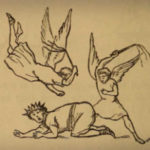We run our website the way we wished the whole internet worked: we provide high quality original content with no ads. We are funded solely by your direct support. Please consider supporting this project.
What Hinders Answers to Prayer
Prayer is powerful and effective, but it’s not magic. There is no automatic guarantee that what we’re praying for is going to come to pass, even when we’re praying with faith and in accordance with God’s will. Prayer is a form of co-laboring with God to change the world in a Kingdom direction. Yet, it’s genuine labor because there are forces that resist this change.
I believe this is why prayer sometimes must be engaged in with persistence (Lk 11:5-8; 18-1-8). It’s not that we need to persistently beg God to do something he doesn’t really want to do. It’s rather that our prayer comes up against obstacles that require prolonged work to overcome. Laboring in the spiritual realm is really no different than laboring on a physical level. Light rocks can be moved quickly, but heavier ones require more persistence. So too, some prayer may produce immediate results, for there’s little resistance to it. But other pray may come against a lot of resistance and thus require more work.
I believe this is also why the Bible encourages corporate prayer.[1] Lighter rocks may be lifted by yourself, but heavier one’s require help.
There are a number of variables that affect if, when, and how prayer affects the world, but at present I’ll simply mention two forms of resistance to prayer.
First, the Kingdom influence of prayer is resisted by the “say-so” of humans whose free will is not aligned with God’s will. Prayer is powerful and effective, but given the kind of world God has created, he cannot simply unilaterally override people’s free will.
For example, praying for someone to come into a relationship with Christ is powerful and effective in increasing the Spirit’s influence on their life, making it more difficult for them to resist the Gospel. But they still must have a choice in the matter. If God could override the free will of people to get them to surrender to Christ, everyone would in fact be surrendered to Christ. For we know that God’s ideal is for everyone to enter into a saving relationship with Christ (I Tim 2:4-6, 4:10; I Pet 3:9).
While this way of thinking about prayer may sound unusual to some readers who have been taught to think that God’s will or human faith are the only two variables that affect whether prayer is effective, I submit to you that we all act on the assumption that what I’m saying is true. Think about it. Many of us pray for protection, but I bet most of us still wear seat belts and lock our doors at night just in case. Why do we do this? It’s because we all on some level know that God’s will, our faith and our prayer aren’t the only variables that decide whether we’re safe or not. People–some of whom are not nice–still have free will.
A second thing that resists the Kingdom influence of prayer is the “say-so” of fallen Powers whose free will is not aligned with God’s will. In Daniel 10 we read that Daniel fasted and prayed to hear from God, and God immediately dispatched an angel in response to his prayer. Yet the answer to Daniel’s prayer was delayed 21 days because the heavenly messenger was resisted by “the prince of Persia” (Dan 10: 12-13).
Notice, the delay wasn’t because God willed there to be a 21-day delay–as though God’s will was the only variable that affects what comes to pass. Nor was it because Daniel lacked faith until the 21st day, as though faith was the only variable that affects what comes to pass. Rather, the delay was due to interference in the spirit realm.
When was the last time you considered that a prayer was possibly “unanswered” because of the interference of renegade Powers?
Along similar lines, Paul told the Thessalonians that he had an “intense longing” to visit them and that he tried “again and again -—but Satan blocked our way” (1 Thess 2:17-18). Paul doesn’t specifically mention that he prayed for a way to visit the Thessalonians, but it’s hard to imagine that he didn’t. In any event, the passage clearly reveals that the “say-so” of spirit agents intersects with our “say-so,” and prayer is one of the central exercises of our “say-so.” What the Powers do conditions, to some extent, what God can and cannot accomplish through prayer.
So, prayer is powerful and effective, but it’s not magic. It’s rather co-laboring with God on a spiritual level to manifest his will “on earth as it is in heaven.” On divine authority we can trust that our prayer always moves the world closer to the Kingdom. But it is not an automatic guarantee that it will accomplish what we are praying for, even when we pray with strong faith and pray in accordance with God’s will.
[1] See, for example, Neh 9:1; 2 Chr 7:14; Mt 26:36, 41; Ac 1:13, 4:24-30; Eph 6:19-20; Col 4:3-4; I Th 5:25; 2 Thess 3:1; Heb 13:18; Ja 5:13-16).
Category: General
Tags: Angels, Free Will, Prayer, Warfare Worldview
Related Reading

What Does Paul Mean that We Will Judge Angels? (podcast)
Greg considers Paul’s claim that Christians will judge angels. Episode 498 http://traffic.libsyn.com/askgregboyd/Episode_0498.mp3

What Unfulfilled Prophesies Say About the Open View
Image by Lori Greig via Flickr Yesterday, we posted about how Messianic prophesies are understood in the open view of the future. Today, this post will look at prophesies that are not fulfilled in the way predicted and what that can tell us about the open view of the future. In John Goldingay’s excellent multi-volume work, Old…

The Spiritual Value of Doing Nothing
It is only when we cease from our striving and rest in the unconditional love of Christ that our soul begins to be nourished and restored. It is only then that we can experience a worth that attaches to our being and not simply our doing. It is only as we experience God’s acceptance of us as we are that…

What is omni-resourcefulness?
Question: What do you mean when you refer to God’s omni-resourcefulness? Can you support this with Scripture? Answer: I and others use the term omni-resourcefulness to highlight a feature of God in Scripture that the classical theological tradition consistently overlooks. Part of the greatness of the God of the Bible, we argue, is that he…

God’s Regrets and Divine Foreknowledge
One aspect of the portrait of God in Scripture that suggests the future is partly open is the fact that God sometimes regrets how things turn out, even prior decisions that he himself made. For example, in the light of the depravity that characterized humanity prior to the flood, the Bible says that “The Lord…

Is God All-Powerful?
I want to answer yes and no. God is all-powerful in the sense that God originally possessed all power. Before Creation, God was the only being who existed, and thus had all the power there was. He could do anything, and nothing opposed Him. But with the creation of free creatures, I maintain, God necessarily…
